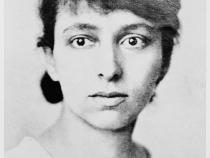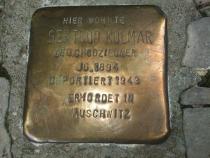Gertrud Chodziesner, known as Gertrud Kolmar, was born on 10 December 1894 in Berlin, the eldest child of Ludwig Chodziesner (1861-1943), a lawyer. She grew up in Westend in Berlin-Charlottenburg. After completing a training course in home economy and agriculture near Leipzig, she worked for a time as a child care worker and language teacher. She became a distinguished poet and writer, publishing her first poems under the pseudonym Gertrud Kolmar in 1917.
In 1923 Gertrud’s family moved to a house at Feuerbachstraße 13 (then Manteuffelstraße 9) in Falkensee-Finkenkrug near Potsdam. Gertrud lived and worked in various cities (Hamburg, Paris, Dijon) but returned to live with her parents in 1928 to care for her ailing mother, Elise, née Schoenflies (1872-1930). After her mother’s death, she took charge of the household, helped in her father’s office, and wrote.
While her siblings all managed to escape, Gertrud stayed in Germany to be with her father. Her publications were boycotted, she was prohibited from using a pseudonym in 1936, and her books were pulped. After the night of the pogroms in 1938, the Chodziesners were forced to sell their house and move to a house at Speyerer Straße 10 (now Münchener Straße 18a) in Berlin-Schöneberg. Subsequently, Gertrud Kolmar was made to perform forced labour in the Epeco cardboard factory at Herzbergstraße 127 in Lichtenberg.
In a letter of 15 December 1942, she wrote: “So I want to accept my fate, whether it be as high as a tower, or as black and burdensome as a cloud.” On 23 February 1943, during the Nazis’ “factory campaign”, she was arrested and deported to Auschwitz, where she was murdered.
The north Schöneberg local library, in the Berlin district of Tempelhof-Schöneberg, has been named after Gertrud Kolmar, as has a street in Berlin-Mitte and the street in Falkensee-Finkenkrug where her parents’ house stood. A stumbling stone and a commemorative plaque have also been placed here. In 2011, a newly bred rose in Hamburg was named the “Gertrud Kolmar rose”; it is cultivated in the garden of the Falkensee museum and gallery.
Selected publications: Gedichte (1917); Preußische Wappen (1934); De Frau und die Tiere (1938); Die jüdische Mutter (1965); Das lyrische Werk (1965)
Gertrud Kolmar (Künstlername) née Chodziesner
Location
Münchener Str. 18 a
Historical name
Speyerer Str. 10
District
Schöneberg
Stone was laid
24 October 2004
Born
10 December 1894 in Berlin
Occupation
Sprachlehrerin und Dichterin
Forced Labour
Arbeiterin (der Fa. Epeco, Lichtenberg, und Charlottenburger Kartonagenfabrik)
Deportation
on 02 March 1943
to
Auschwitz
Murdered
in Auschwitz




